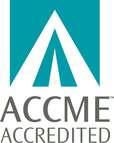Accreditation Statement

The American Association for Cancer Research (AACR) is accredited by the Accreditation Council for Continuing Medical Education (ACCME) to provide continuing medical education activities for physicians.
Credit Designation Statement
AACR has designated this live activity for a maximum of 6.25 AMA PRA Category 1 Credit(s)™. Physicians should only claim credit commensurate with the extent of their participation in the activity.
Credit certification for individual sessions may vary, dependent upon compliance with the ACCME Accreditation Criteria. The final number of credits may vary from the maximum number indicated above.
Claiming (CME) Credit
Physicians and other health care professionals seeking AMA PRA Category 1 Credit(s)TM for this live continuing medical education activity must complete the online CME Request for Credit Survey by June 21, 2024. Certificates will only be issued to those who complete the survey. The Request for Credit Survey will be available via a link on the AACR website and via email. Your CME certificate will be sent to you via email after the completion of the activity.

Successful completion of this CME activity, which includes participation in the evaluation component, enables the participant to earn up to 6.25 Medical Knowledge MOC points in the American Board of Internal Medicine’s (ABIM) Maintenance of Certification (MOC) program. Participants will earn MOC points equivalent to the amount of CME credits claimed for the activity. It is the CME activity provider’s responsibility to submit participant completion information to ACCME for the purpose of granting ABIM MOC credit.
To receive ABIM MOC, participants must request MOC in the CME Request for Credit Survey and complete all questions. Once these steps are completed, AACR will submit your completion information via the ACCME’s Program and Activity Reporting System for the purpose of granting MOC points.
Statement of Educational Need, Target Audience, and Learning Objectives
When clinical trial Keynote-522 led to the approval of pembrolizumab for early-stage triple breast cancer, there was limited awareness that treatments could adapt based on response to surgery. In addition, the trial design in Keynote-522 didn’t isolate the treatment effects of the neoadjuvant and adjuvant phases or provide a clear assessment of the added toxicity. As a result, many clinicians were left with no clear standard of care and have designed treatment regimens with limited data.
The emergence of many cancer therapies has transformed the landscape of treatment for various cancer types. Although ongoing clinical trials have signaled improved treatment outcomes for patients in early-stage cancer, recently reported results and approved regimens in the perioperative space for breast, lung and other cancers raise questions regarding optimal therapy and the potential for overtreatment leading to unnecessary toxicities.
The purpose of this one-day workshop is to provide an interdisciplinary forum to discuss the best practices of trial design, analyses, and interpretation of trials with multiple phases of treatment (e.g., resectable lung cancer, early-stage breast cancer). The goal is to foster robust scientific discussion to explore approaches to address uncertainty in interpretation of the several high-profile clinical trials which contain regimen approaches, which do not isolate the contribution of each phase to the regimen. Ideally, this workshop will advance methods to incorporate multiple arms when it is feasible and reasonable in trials with multiple phases of a regimen. This conference will explore considerations for the assessment and interpretation of Overall Survival (OS) in early-stage trials with regimen approaches, where long term OS is a critical variable.
This activity would be appropriate for physicians, basic, translational, and clinical cancer researchers, advocates, and health care professionals involved in the field of early-stage cancer.
After participating in this CME activity, physicians should be able to:
- Assess the role of neoadjuvant and adjuvant therapy in early-stage cancer.
- Identify best practices to incorporate endpoints in clinical decision-making for resectable cancers.
- Evaluate strategies to identify the optimal duration of neoadjuvant and adjuvant therapy in early-stage cancer.
- Identify best practices to select the optimal approach in the management of residual disease in early-stage cancer.
Disclosure statement
It is the policy of the AACR that the information presented at AACR CME activities will be unbiased and based on scientific evidence. To help participants make judgments about the presence of bias, AACR will provide information that Scientific Program Committee members and speakers have disclosed all financial relationships they have with ineligible companies whose primary business is producing, marketing, selling, re-selling, or distributing healthcare products or services used by or on patients. All of the relevant financial relationships for these individuals have been mitigated.
Acknowledgment of Financial or Other Support
This activity is supported by Professional Educational Grants which will be disclosed at the activity.
QUESTIONS ABOUT CME?
Please read our frequently asked questions. If you still have questions, contact the Office of CME at (215) 440-9300 or [email protected].

